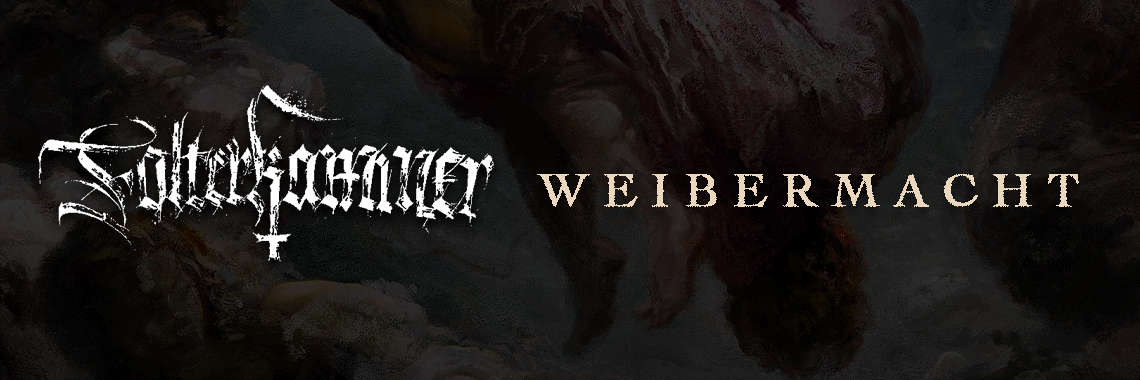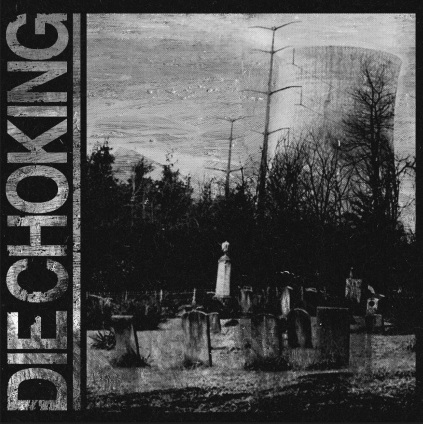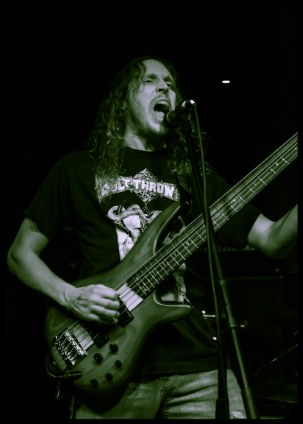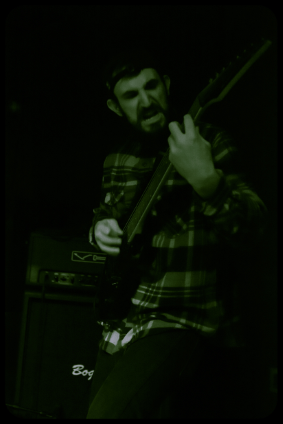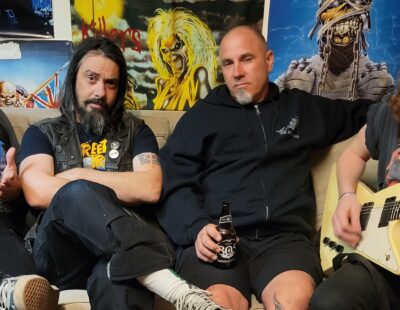Back in January Philadelphia grind-punk all-stars Die Choking — bassist/vocalist Paul J. Herzog (ex-Total Fucking Destruction), drummer Joshua T. Cohen (Cop Problem), guitarist Jeffrey V. Daniels (Burden) — hit the ground running, unleashing a leveling sonic devastator in the shape of a debut self-titled digital E.P. as infectious as it is unsettling.
A few weeks from now the band will open the Philly stop of the Decibel tour, and then there will be a new five-song salvo this summer on The Compound leading into a full-length before the end of the year.
It seemed like the perfect time to get the lowdown straight from the (choking) horse’s mouth…
Give me a little background on the origins of the band. Was there a certain sonic goal at the outset or did you just want to see what happened when the three of you jammed?
Joshua T. Cohen: Nothing specific other than the yearning to create some super fast and brutal tunes. I had feelers out for a guitarist who was fond of the like and was referred by a mutual friend. Probably the most common criticisms to each other during the jamming/writing process continue to be “play faster,” “more brutal,” “faster, faster,” “good, but…faster.” We just recorded our second EP due out later this summer, and are working on the LP. The new tracks continue to get faster, we’re adding more nuances and weird time signatures to the speed as things progress.
Paul J. Herzog: Coming in, I wanted to strip things down from a performance, writing, and recording stand-point. I came to the table with some riff and lyrical ideas and wanted to execute a more mid-range vocal style with dudes like Blaine Fart, Kurt Brecht, Chuck Schuldiner and Martin Van Drunnen as the foundational influence. Something different than the typical high/low alternating approach that dominates most grindcore. We are open-minded, very eclectic in our personal musical preferences, and still completely obsessed with our instruments. There is a physical component to the style of music that we play and embrace. I like that endurance piece of it. And, as a grindcore band, the interest and opportunity to progress is really unending.
At what point in the writing process did you guys decide Die Choking was the most appropriate moniker to hang over your creation?
Cohen: We had been jamming together a few months and were throwing around names.To be completely honest, I coined it thinking about what I would like to happen to a certain NFL quarterback convicted of killing, torturing, and maiming around 75 dogs. Like, “Man I wish that piece of shit would just Die Choking already.” Seemed to fit the mood of the tunes we were writing and Paul liked that it could be interpreted many ways.
Herzog: Whew…Thank God I am a Chicago Bears fan! Thank Satan I mean. MACABRE rules! THE DEAD YOUTH rules! In all seriousness, I love the origin and directness of the name and greatly respect the ideology and lifestyle of my bandmate brothers.
One of the things I love about your songs is how much ground is covered without losing the flow or employing jarring drop-offs. Is that something that just comes naturally or are each of these tracks a beast to put together?
Cohen: I think it happens pretty naturally. Usually someone will come to the table with a riff or two and maybe a transition, we’ll all get it down, then it’s chop up time. A lot of our revision process is going back, trimming parts down, cutting the fat etc. Something might start as eight bars then get chopped down to four, two, sometimes left with just one bar of a part that started at eight. We didn’t want a lot super-short, fifteen second songs. I like the idea of giving the listener a little time to lock into a groove, but we also don’t have the patience for traditional three or five minute metal songs. The first EP that is out now definitely has a slightly different feel than the newer material about to come out. We shifted Paul from guitar to bass and Jeff is focusing solely on guitar. The fast parts are faster but moodier and darker. Drawing a little more power-violence and Nasum-esque brutality. I don’t think you’ll see the same release twice from Die Choking as things progress.
Herzog: I can definitely say that the songs aren’t unnecessarily obsessed over or nit-picked. Some riffs are written at home and then changed substantially to fit a drum part or vocal cadence. Often times shit is just written on the fly in the rehearsal space. Intro, A, B, A, B, Outro… Basic shit and really focusing on riffs that stand on their own without a bunch of layers and dressing thrown on top. Barf out riffs, barf out thoughts. The more caustic stuff leaves a heavy taste of bile and comes directly from the guts.
You’ve all been in or are currently members of awesome bands. What do you get out of Die Choking that you haven’t gotten out of past projects?
Cohen: So ya, I also play drums in Cop Problem which is a very different approach to being in band all around. Cop Problem is a political hardcore punk band where the politics and social elements are weighed just as heavily as the music. We’re all vegan or vegetarian with a lot of focuses on current political issues. Everything from booking live, to practicing, and how we handle press is approached in a different context. Having my sister Deb in the band also makes things interesting and fun. To answer your question specifically — Die Choking has a much more rapid approach to crafting music. We all live very close to one another in Philly and can pick up and jam anywhere from two to four times per week. With Cop Problem, our bassist is in North Jersey which makes planning and organizing a little more challenging and the songwriting process tends to be a lot longer for Cop Problem, which I don’t view as a negative — just is what it is. But like my cohorts in Die Choking, I think we all have an itch to play as much and as often as possible. We also really push each other’s physical limits. I have always felt a musician’s reach should exceed his or her grasp. Write songs and sections that are too difficult or fast to play perfectly and then force yourself to get it right, then up the ante again.That’s pretty much the approach to Die Choking — continually pushing our physical limits and trying to outdo ourselves with each practice and show.
Herzog: Once you go fast you don’t go back. I have tried over the last seven or so years to play more moderately paced music in an aggressive context. As I have aged, I have found it difficult to jam with musicians who don’t at least have the capacity to blast at 320 beats per minute. Certainly jamming with Rich in Total Fucking Destruction primed my interest in this but Die Choking really emphasizes a combination of both speed and power. Bringing in Jeff from Burden really completed the package by adding some depth and dark ambience to the performance and writing process. In my opinion, this combination is hard to capture in really fast music.
Talk to me about lyrical content.
Cohen: Lyrics are Paul’s territory so I’ll leave this to him. But I will say it’s always important to me that the bands I play in have something important to say behind the music. Not some obnoxious heartbreak rant or worse than obnoxious narcissistic themes… I really like that Paul touches on social and systemic issues in his lyrics ranging from everything from greed and corruption to medical ethics. I like a good real-world lyrical base. Love songs and Dungeons and Dragons themes were never my cup of tea.
Herzog: God, I am gonna sound like a pretentious prick saying this but fuck it. I have my degrees in Political Science, Philosophy and Nursing. Suffice it to say, I am extremely sick of reading. My current job as an ICU nurse informs a portion of what I feel about health, acuity, and the human condition — especially here in the U.S. I am very interested in discussing developing political structures and both the success and corruption within corporate, political, military, and religious bureaucracy. Additionally, being a fairly longtime Philadelphian places you in the heart of origins per se. To me, there is a BIG difference between 1.) being critical and 2.) being a privileged, whining, weiner who is trying to “sing” about brutal things. The majority of modern “extreme” music falls into the latter category…but I still fucking love it! Ha! I don’t consider myself adherent to one particular viewpoint and to be hypocritically honest often times the simple sound of a combination of words can be as important as the content of meaning. Kind of a David Byrne kind of approach I suppose… In the end, it is a personal thing and ultimately I don’t care how people may interpret a “message.” This is a cathartic and creative exercise that fosters my own mental and physical health.
Have you been surprised at all by how quickly the band has been embraced?
Cohen: Short answer is, yes. When you create art and music to please yourself and then find that others can partake in the enthusiasm, it is always a trip to me. It’s hard to separate yourself from your art. I feel very fortunate that people have embraced Die Choking the way they have thus far. Very stoked to have linked up The Compound for this first round of releases.
Herzog: Absolutely. It is completely awesome/insane to me that there is a subculture dedicated to appreciating and differentiating loud, fast music with crazy vocals. How fucking bizarre is that? Extreme music fans have been getting screamed at by assholes like me for goddamn decades! As a result, we metalheads are very adept at being chill in social circumstances of extreme insanity. I am proud of that trait.
Finally, are you looking forward to playing with Carcass and Gorguts on the Decibel tour’s Philly stop? Is it nerve-wracking at all?
Cohen: Yes and Yes. Carcass and Gorguts on the same bill is fucking gnarley. And to top it off, it’s Decibel’s fucking hometown show. How rad is that? I tend to get a rush of nerves before every show small, medium, large…I think that’s part of the live experience — a healthy mix of nerves, adrenaline, excitement, anxiety, and then the physical and emotional avalanche of release as you play. To quote Bill Burr, “This Is What We Play For!”

